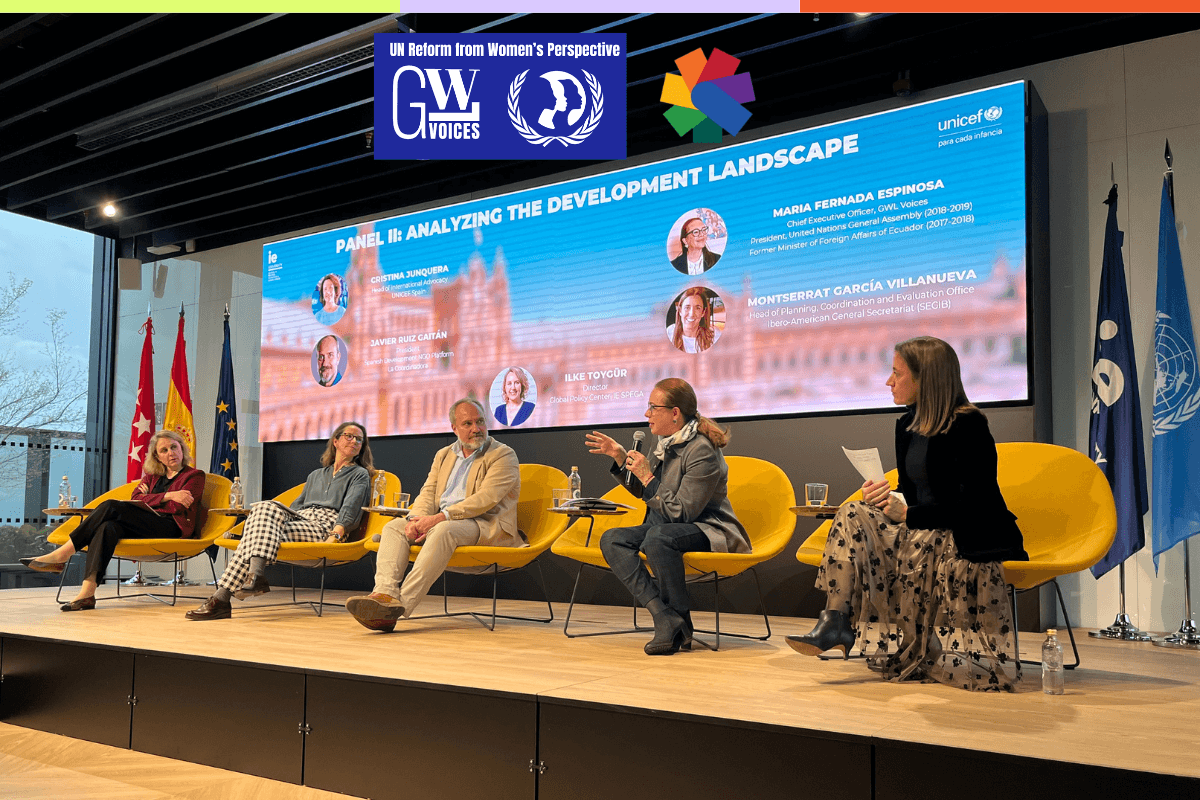Ms. María Fernanda Espinosa Calls for Bold Multilateralism and Gender-Inclusive Reform

Share
GWL Voices Executive Director, Ms. María Fernanda Espinosa, brought a powerful message of urgency, equity, and reform to the IE University event on Financing for Development – Pathways to Sustainable Growth, held in collaboration with UNICEF Spain. The event, part of the road to the upcoming Fourth International Conference on Financing for Development (FfD4) in Seville, gathered global leaders and thinkers to dissect systemic failures and innovative solutions in the development financing landscape.
IE University’s Provost, Manuel Muñiz, opened the event with a clear call: financing mechanisms must work for all, especially the most exposed and underserved populations. José María Vera, Executive Director of UNICEF Spain, underscored the moment’s moral and strategic clarity: “People say it’s not the best time to advocate for Official Development Assistance (ODA). It is exactly the right time.”
In the high-level panel “Analyzing the Development Landscape,” Ms. María Fernanda Espinosa cut through technicalities to highlight the political realities shaping development finance today. “This conversation sounds technical, but in the end—it is a political discussion,” she stated, drawing attention to the $4.2 trillion annual financing gap and the fact that 83% of the Sustainable Development Goals (SDGs) are off track.
Multilateralism in a Fragmented World
Ms. Espinosa brought a clear-eyed analysis of the multilateral system’s current fragmentation and the growing dilemma facing UN member states: whether to pursue inclusive outcomes through consensus or bold solutions through majoritarian approval. “Consensus does not mean unanimity,” she stressed. “We need both ambition and coalitions of the willing—particularly on high-ambition issues like gender equality, debt restructuring, and financial inclusion.”
The role of the United Nations as the most democratic global forum was at the heart of Ms. Espinosa’s remarks. Despite calls to bypass or reform it, she emphasized that the UN remains the most legitimate space for addressing systemic inequities—especially those affecting the Global South, or as she reframed it, the Global Majority.
A Feminist Lens on Financing
Representing GWL Voices, Ms. Espinosa reminded the audience that gender is not a side issue—it’s central to effectiveness. “Women’s representation is not only a matter of justice—it has measurable impacts on social cohesion, GDP growth, and policy outcomes,” she said, pointing to UN Women data that shows $1.5 billion per year is needed to close the gender gap in development.
Echoing the values of Spain’s new feminist cooperation strategy, Ms. Espinosa made the case for transforming Official Development Assistance (ODA) into ODC—Official Development Cooperation—anchored in rights, equity, and long-term structural change. “This is a value system failure. And it's a political choice,” she said. “Investing in gender isn’t charity—it’s smart economics.”
The Path to Seville: Will It Be Bold or Bland?
With Seville’s FfD4 conference approaching, panelists debated the likely outcomes: a diluted declaration reflecting fractured consensus, or a bold, transformative roadmap backed by a coalition of the willing. GWL Voices Executive Director explained that “we can have both. It is not an either or: a high ambition ‘coalition of the willing,’ and also a negotiated outcome which is central to an intergovernmental negotiation. The ideal will be to have a strong, ambitious and action oriented negotiated outcome.”
“Let’s not restate what was said before,” she concluded. “Let’s move from billions to impact. From rhetoric to results. And from promises to power shifts—especially for women, youth, and the Global Majority.”
GWL Voices: Driving Systemic Change
As the world prepares for FfD4, GWL Voices continues to champion gender equality in multilateralism, advance systemic reform, and amplify the leadership of women. Ms. Espinosa’s intervention at IE University was a powerful reminder that achieving the SDGs requires more than finance—it demands vision, courage, and inclusivity. She also participated in the Delphi Economic Forum alongside key global leaders to discuss transforming the global financial system to address inequalities. As we prepare, we continue working towards a more inclusive financial architecture.
Our #GWLVoices ED @mfespinosaEC highlights the importance of investing in women as a central strategy to achieve the SDGs and boost countries’ GDP—crucial themes in this important conversation on the #FfD4
— GWL Voices (@GWLvoices) April 4, 2025
✨ Special thanks to the organizers @iespega @unicef_es @MAECgob @AECID_es pic.twitter.com/RhKpR3eoxZ